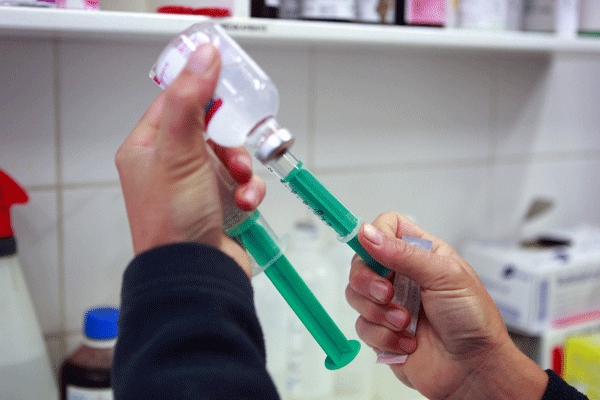A compounded drug caused the deaths of four horses and sickened six others in May, prompting an investigation by the U.S. Food and Drug Administration. The incident highlighted concerns about the use of unapproved medications for horses.

The horses—eight Thoroughbreds at a training stable in Ocala, Florida, and two others in Kentucky—suffered seizures, fever and other signs after being given a combination of two drugs, pyrimethamine and toltrazuril, intended to treat or prevent the neurologic disease equine protozoal myeloencephalitis. FDA tests pointed to high levels of pyrimethamine as the cause. This drug is considered safe for horses at a dose of 1 milligram per kilogram of body weight. But the actual concentration in the compounded medication was about 30 times higher than the recommended dose, according to Dr. Robert MacKay of the University of Florida, who helped treat several of the horses.
“It’s amazing any horses survived,” Dr. MacKay says. The products, a liquid and a paste, were made by Wickliffe Pharmacy of Lexington, Kentucky, and were not in general distribution. Wickliffe stated that the medication was specifically made for and dispensed to the horses for which it was prescribed and no others received it.
Veterinary compounding pharmacies like Wickliffe make custom medications from bulk ingredients to fill needs that can’t be met by commercially available drugs. Compounded medications do not go through the rigorous FDA approval process applied to commercial drugs, but federal rules state that they must be modified versions of approved drugs, not new medications. For example, a compounding pharmacy might make a liquid version of a drug commercially available in only pill form or add flavoring to make a drug more palatable. Compounding may also be necessary when an approved drug isn’t commercially available.
In this case, Dr. MacKay says, ���EPM drugs are available that contain the same or very similar drugs but not in the same combination.” The FDA-approved drugs for EPM include a combination product containing pyrimethamine and sulfadiazine (ReBalance®, PRN Pharmical); ponazuril (Marquis®, Bayer DVM); and diclazuril (Protazil®, Merck Animal Health). Toltrazuril, which is in the same drug family as ponazuril, is not approved for use in horses in the United States. It’s sold for use in poultry and livestock in Canada and several other countries.
“The compounding pharmacies try to finesse FDA regulations and patent law by making a drug that is a little different or in a different combination than the FDA-approved drug manufactured by a pharmaceutical company,” Dr. MacKay says. Commercial EPM medicines that are FDA-approved and made by large pharmaceutical companies are very safe, he adds; those from compounding pharmacies are almost always safe, but occasional errors may occur.
It’s not clear whether the affected horses were given the compounded drug for treatment or prevention of EPM. In some training stables, Dr. MacKay says, such drugs are given to horses that are a little off or underachieving on the theory that the drugs may help if the problem is EPM and won’t hurt otherwise. In this incident, “We’ve just found out the latter isn’t always true,” he notes. “Some establishments give the drug every day to every horse, presumably as a prevention strategy. This practice is on the fringes of veterinary medicine and is certainly not based on any evidence that I’m aware of,“ he adds.
In a statement, the FDA expressed serious concerns about the use of unapproved drugs for horses, including some compounded combination products. “These drugs are not evaluated by FDA and may not meet FDA’s strict standards for safety and effectiveness. Unapproved animal drugs also may not be labeled or advertised appropriately. Horse owners or caretakers should consult with their veterinarians about other therapies.”
This article originally appeared in the August 2014 issue of Practical Horseman.










